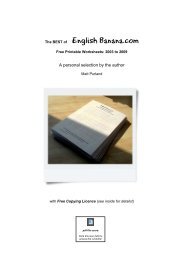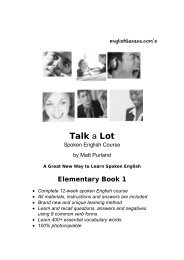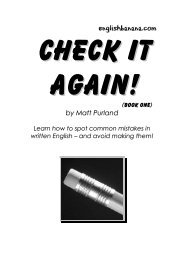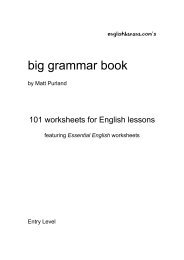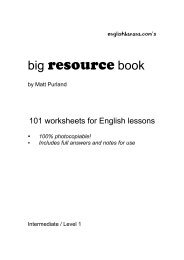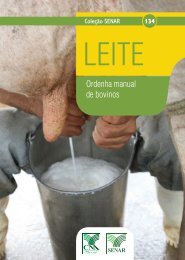activiTy
You also want an ePaper? Increase the reach of your titles
YUMPU automatically turns print PDFs into web optimized ePapers that Google loves.
English Banana.com<br />
Games for the Classroom<br />
Audio Pictures<br />
Get the students into pairs, then give one half of the pair a picture from a magazine, for<br />
example, a man wearing a hat and coat and playing the piano. They have to describe what<br />
they can see, in detail, without showing the picture to their partner, who draws a sketch based<br />
on the description. At the end of the description they compare their pictures, before swapping<br />
roles. At the end of the session the whole class can see how close all the drawings were to<br />
their originals. A good activity for practising communication and listening skills, and giving<br />
descriptions.<br />
Our Living Photo Album<br />
Ask each student to bring in one or more photographs of something that is important to them,<br />
that you can keep to put into a class photo album. Give them time to prepare a two-minute<br />
talk about their photograph, which could be, for example, of a place, or a family member or an<br />
event that has touched their life. Then sit in a circle with all the students and your ‘living photo<br />
album’ will come to life, as each student in turn explains why their photo is important or<br />
memorable to them. You could make a display with the pictures, or literally fill an album with<br />
them that everyone can enjoy looking at. Explain that you will give the photos back at the end<br />
of the course (or even at the end of the week). This is a good activity to help a relatively new<br />
group get to know each other.<br />
Reading and Writing Skills<br />
Ace Anagrams<br />
Students at all levels enjoy puzzling over this game. It’s also a good way to get them looking<br />
in their dictionaries. Your students suggest nine letters at random, either vowel or consonant,<br />
which you write on the board. (Or you could have cards with them on if you’re really<br />
organised!) In small groups the students have five minutes to come up with as many (real)<br />
words as they can from the original nine letters. The team with the most words spelt correctly<br />
gets a point, and the next round begins.<br />
Hangman<br />
Another good letters-based game. It’s good because students can get up and lead this one<br />
just as well as the teacher. It’s also good because it’s quick and can pull students together for<br />
a quick bit of group work just before going home. Think of a word or phrase and draw a<br />
number of dashes on the board that corresponds to the number of letters. The other students<br />
suggest one letter at a time. If they are correct you have to fill in the letter on the board in its<br />
correct place. If they are incorrect you draw part of the hangman shape. Students can take a<br />
guess if they know the word. The person who guesses correctly steps up to the board to think<br />
of a word for the next session.<br />
What Time Is It On...?<br />
A good one for testing telling the time, and as a general reading comprehension using realia.<br />
Select a page from the Radio Times, or any English language TV guide and photocopy it so<br />
that each student can have a copy. Split the group into two teams and ask them questions<br />
based on the programme information given in the TV guide. For example, you could ask,<br />
For more fun worksheets, games and quizzes log onto www.englishbanana.com now!<br />
big activity book © English Banana 2004 88.




